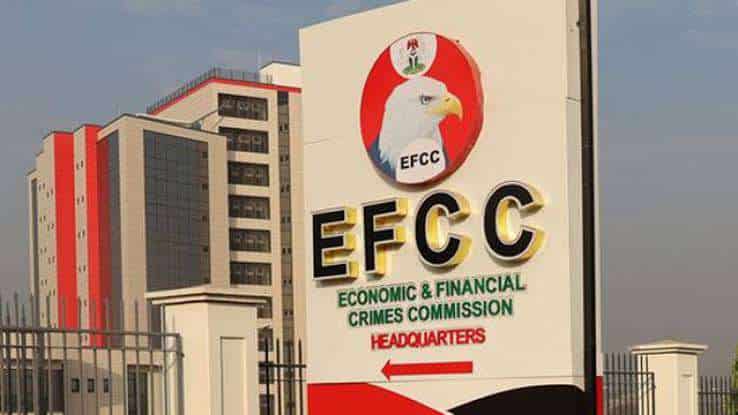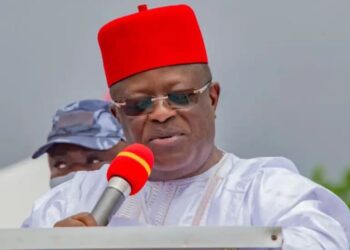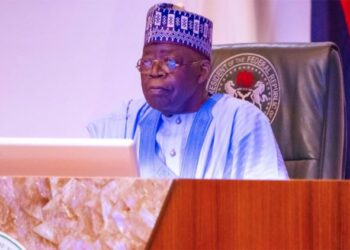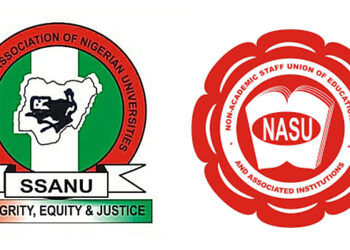No fewer than N721bn was received as bribe by Nigerian public officials in 2023, a new report by the National Bureau of Statistics has stated.
The report released on Thursday titled, “Corruption in Nigeria: Patterns and Trends”, said the N721bn paid in bribes amounts to about 0.35 per cent of Nigeria’s Gross Domestic Product.
The result was based on a survey conducted with the United Nations Office on Drugs and Crime.
According to the survey, the average cash bribe was N8,284, an increase from an average of N5,754 in 2019.
Mohbad’s father appeals for Nigerians’ help in unraveling cause of son’s death0.00 / 0.00
The report read in part, “According to the 2023 survey, the average cash bribe paid was 8,284 Nigerian Naira. While the nominal average cash bribe size increased since 2019 (from NGN 5,754), this does not account for inflation. The inflation-adjusted average cash bribe in 2023 was 29 per cent smaller than in 2019 in terms of what could be bought with the money.
“Overall, it is estimated that a total of roughly NGN 721 billion (US$1.26 billion) was paid in cash bribes to public officials in Nigeria in 2023, corresponding to 0.35 per cent of the entire Gross Domestic Product of Nigeria.”
The report stated that corruption was ranked fourth among the most important problems affecting the country in 2023, after the cost of living, insecurity and unemployment.
It added, “This suggests relatively stable and high levels of concerns about corruption over time and compared to other concerns such as education or housing.
“Nigerians confidence in the government’s anti-corruption effort has been declining over time and across regions. While in 2019, more than half of all citizens thought that the government was effective in fighting corruption, in 2023, the share declined to lessons than a third of all citizens. The downward trend in the citizen’s confidence is observable across the entire country, with all six zones recording reductions of more than 10 percentage points between 2019 and 2023 in terms of the share of citizens who thought the government was effective in fighting corruption.”
The report indicates that 56 per cent of Nigerians interacted with a public official in 2023, down from 63 per cent in 2019.
Despite this reduction, bribery remains widespread, with an average of 5.1 bribes paid per bribe payer, totalling approximately 87 million bribes nationwide. This is a decrease from the 117 million bribes estimated in 2019.
It was also disclosed that bribery is more common in rural areas, with rural residents paying an average of 5.8 bribes compared to 4.5 bribes in urban areas.
On payment mode, the report noted that over 95 per cent of bribes were paid in monetary form (cash or money transfer) in 2023.
It said public officials were more likely to demand bribes while private sector actors included doctors in private hospitals, which increased from 6 per cent in 2019 to 14 per cent in 2023.
Despite this rise, bribery in the public sector remains about twice as high, with public sector contact rates also being twice as high as those in the private sector.
In 2023, 27 per cent of Nigerians who interacted with a public official paid a bribe, a slight decrease from 29 per cent in 2019. Including instances where bribes were requested but refused, over one-third of interactions between citizens and public officials involved bribery.
Similarly, the report shows a growing trend of Nigerians refusing to pay bribes. In 2023, 70 per cent of those asked to pay a bribe refused at least once, with the highest refusal rates in the North-West zone at 76 per cent. All regions recorded refusal rates above 60 per cent. This indicates that Nigerians are increasingly standing against corruption.
According to the report, bribery is becoming less accepted in Nigeria. The percentage of citizens who view bribery requests as acceptable to expedite administrative procedures decreased from 29 per cent in 2019 to 23 per cent in 2023.
Fewer citizens reported suffering negative consequences after refusing bribe requests in 2023 compared to 2019. This suggests a growing empowerment among Nigerians to confront corrupt officials without fear of repercussions.
In 2023, 21 per cent of bribe refusers indicated they refused because they had other options. Normative concerns (42 per cent) and cost of living pressures (23 per cent) also played significant roles in their refusal to pay bribes.
Furthermore, not less than 60 per cent of public sector workers were hired due to nepotism, bribery or both between 2020 and 2023.
The report noted that six out of 10 successful candidates admitted to using either nepotism, bribery, or both to improve their chances of being recruited.
Specifically, 27 per cent of these candidates admitted to using only bribery, 13 per cent to only nepotism, and 19 per cent to both bribery and nepotism. On the other hand, 40 per cent of the candidates claimed to have secured their positions without resorting to any such means, based on data collected between November 2020 and October 2023.
The report read, “The selection process used to recruit public officials plays a crucial role in shaping the culture of integrity that should drive the civil service as well as ensure that recruits have the highest standards of professionalism and merit.
However, the 2023 survey findings indicate that the public sector recruitment process requires closer monitoring, as almost half (46 per cent) of people who secured a job in the public sector in the last three years before the survey admitted that they paid a bribe to facilitate their recruitment – about 1.5 times the share found in the 2019 survey (31 per cent).
“The 2023 survey also found evidence that a considerable number of people recruited into the public sector secured their posts with the help of a friend or relative, many in addition to paying a bribe: of all successful applicants in the last three years before the 2023 survey, 32 per cent were helped by friends or relatives. Overall, in the three years before the 2023 survey, around 60 per cent of public sector applicants in Nigeria were hired as a result of nepotism, bribery or both – about 1.2 times the share found in the 2019 survey.”
The report also noted that the use of bribery is notably lower when the recruitment process includes formal assessments.
Specifically, 51 per cent of candidates were not formally assessed, and of these, a significant 53 per cent admitted to using bribery or nepotism to secure their positions.
Conversely, among the 49 per cent of candidates who underwent a written test or oral interview, the use of unethical means such as bribery or nepotism dropped to 41 per cent.
The report read: “The 2023 survey data show that approximately half (49 per cent) of those who secured a position in the public sector in the three years before the survey passed a written test and/or oral interview during the recruitment selection process. Importantly, the data suggest that the means of selection had a role in facilitating or preventing the use of illegal practices during recruitment. Among those who underwent an assessment procedure (written test / oral interview), 41 per cent made use of bribery, while the share was as much as 53 per cent among those who were not formally assessed.”
It was also disclosed that bribery is more common in rural areas, with rural residents paying an average of 5.8 bribes compared to 4.5 bribes in urban areas.












